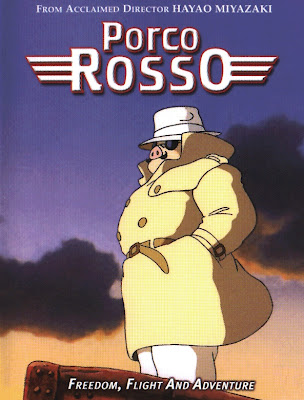Porco Rosso (1992), Directed by Hayao Miyazaki 3.5 stars
 Porco Rosso aka The Crimson Pig aka the once great aviator
and dogfighter Marco (at least in the Disney-dubbed English version) has pretty
much given up on the world. The ace
pilot has literally devolved into a pig, ostensibly due to some sort of curse
to which vague reference is made. When
he is not doing mercenary battle with sky pirates, he gorges himself, smokes and
drinks incessantly. It lies to the ladies
in his life to ultimately reawaken the spirited idealism of his youth. Like Rick in “Casablanca,” Porco is fortunate
to have encountered a woman (two in fact) able to slowly chip away at the bitterness
that takes away the pain and nudge him to a hero’s redemptive state. The first is Gina, a chanteuse and a close friend
of Porco from long before he lapsed into his peculiar, porcine state. The other is Fio, a young, energetic,
airplane engineer who after redesigning and helping to repair his plane, accompanies
him on his quest.
Porco Rosso aka The Crimson Pig aka the once great aviator
and dogfighter Marco (at least in the Disney-dubbed English version) has pretty
much given up on the world. The ace
pilot has literally devolved into a pig, ostensibly due to some sort of curse
to which vague reference is made. When
he is not doing mercenary battle with sky pirates, he gorges himself, smokes and
drinks incessantly. It lies to the ladies
in his life to ultimately reawaken the spirited idealism of his youth. Like Rick in “Casablanca,” Porco is fortunate
to have encountered a woman (two in fact) able to slowly chip away at the bitterness
that takes away the pain and nudge him to a hero’s redemptive state. The first is Gina, a chanteuse and a close friend
of Porco from long before he lapsed into his peculiar, porcine state. The other is Fio, a young, energetic,
airplane engineer who after redesigning and helping to repair his plane, accompanies
him on his quest.
It’s often acknowledged that Hayao Miyazaki, the director
and writer, is at his very best when animating objects in flight, and this film
is filled with extended sequences during which planes soar through the skies in
hot pursuit, in pitched battle, or simply for a pilot’s sheer thrill of flying. One particularly memorable aerial sequence occurs
as Porco recounts a vision he had during a particularly bloody dogfight during
the Great War. A glimmering pattern of
what at first appear to be specs of dust appears high above him in the
distance. Suddenly, planes emerge from
the clouds below, and as they slowly continue their ascent, they themselves eventually
merge with the speckled band: a ghostly gathering of pilots and planes formed from
the extensive casualties of air warfare.
It is an unanticipated, extremely powerful emotional moment in an
otherwise fairly light-hearted romp. The
moving images work their magic beautifully, providing us our one and only glimpse
into the soul of the hero.
This film is not a well-known
or particularly highly-regarded product of Studio Ghibli, Japan’s premier
animation house. However, upon seeing it
on the big screen recently, my second viewing in the space of about a year, I enjoyed
the film quite a lot—a lot more, in
fact, than I had when I originally watched it on DVD. Whether my recent, more positive reaction was
as a result of a shared viewing experience, the size of the screen, the quality
of the dubbing, the pristine print, or likely some combination of all these elements,
I don’t know, and it really doesn’t matter much. The intermixing of adventure, humor, and, on
occasion, deep pathos worked for me, and on a big screen, this combination worked
together even better. Now as to the kid in the seat behind me
who kept kicking my chair …

No comments:
Post a Comment